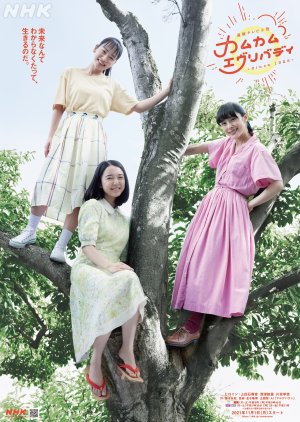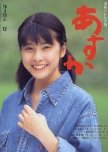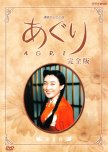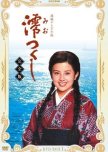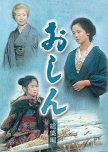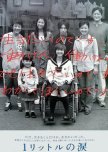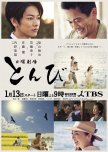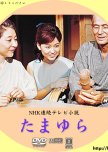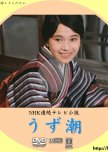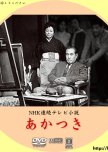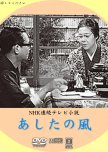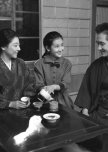
This review may contain spoilers
A high-concept asadora let down by subpar writing
The grand idea of this series was to have an asadora that would span 100 years of Japanese history through the stories of the lives of three generations of women: Yasuko born in 1925 who is the mother of Rui born in 1941 who is the mother of Hinata born in 1965.Yasuko's story (episodes 1-35) is actually quite good if utterly tragic. She is born into a family of confectioners in Okayama, and at age fourteen falls in love with a rich college student. But, don't worry, she isn't married and pregnant until age 16. All of her blood relations (except her unreliable older brother) as well as her husband are all killed in the war, and her mother-in-law irrationally blames Yasuko for her son's death in combat and chases her out of the household. Yasuko tries to raise Rui alone by selling sweets on the streets of Osaka, but when she breaks an arm in a traffic accident she's forced to return to the mansion of her dead husband. A rather ineptly written love pentagram results in her older brother absconding with her savings and fleeing to Osaka chased separately by Yasuko and, yes, independently 6-yearold Rui. Both return return to the mansion in Okayama where Rui tells Ysauko "I hate you" and so Yasuko flees to America with a tall blond officer from the American occupying forces. No, none of that week's episodes makes any sense at all.
Rui's story (episodes 36-77) begins after a time leap to her adulthood where with no motivation given whatsoever she leaves the rich household and cuts off all ties with her family. The generation that chased her and her mother out of the house are now dead and she has a perfectly fine relationship with her uncle who is now the head of the household. In Osaka she finds new joy as a laundress, and falls for customer who is a jazz trumpeter, Joe. He wins a bizarre one-off trumpet competition and lands a recording contract in Tokyo. But, unfortunately, his lips break while recording his debut record (as a former trombone player, I have to say that this plot point is utterly bizarre). He distances himself from Rui, and tries to end his life, but she saves him through the power of Satchmo. They get married, move to Kyoto, obviously, and start a shop that only sells kaiten yaki since that's the only recipe she managed to learn from her mother, and, apparently, it's impossible in the 60s to learn any other recipes. They have Rui and later her brother Momotaro. Joe is happily unemployed for 20-odd years until he suddenly has the bright idea of trying to play another instrument. No, that does not make any sense at all.
Hinata's story (episodes 78 - 112) has her finding a love of samurai dramas as a child and becoming an employee at a local studio's tourist trap where she is given the mission to "save period dramas" in Japan. She has an extended courtship with a samurai drama extra which does not work out after an 8 year time leap in which nothing changed whatsoever in their relationship. Eventually, an American film company comes to town looking to make a big budget Hollywood film in Japan and so Hinata saves the period drama in Japan by serving snacks like any good office lady and speaking the English she has learned via the same radio show that Yasuko and Rui used to study English. The final two weeks of episodes bring all three of women back together in a way that makes even less sense than the rest of the series.
A "drama that spans a century" seems like a solid concept, but the writing utterly fails the concept throughout this series. Like most asadoras there are many fun and interesting side characters, and the performances of the actors are up to the usual high standards for these productions. But the motivations of the characters for the various plot points are FREQUENTLY incomprehensible or non-existent throughout this asadora, and the necessary time leaps almost always reveal zero change in the characters lives in the intervening years. Much of what happens throughout would make sense if the particular arc took place over a year or two, but absurd plot points are spread out sometimes over decades in ways that truly ruin this series.
Was this review helpful to you?

This review may contain spoilers
The Worst TV show ever!!!
"The story is about 100 years-old family, three generations, grandmother, mother, and daughter who walked with a radio English course during the Showa, Heisei, and Reiwa eras."I've been watching this TV show everyday, but I gotta tell you. "Come Come Everybody" is the Worst TV show that I've ever watched.
Here is why.
- The main story is full of inconsistencies and contradictions.
- Inappropriate scenes (crime scenes, "Oshin" parady, etc.)
- Boring scenes (Rui and Hinata)
- Unpleasant characters (Santa, Momotaro, etc)
- Allegations while running the show (Yu Shirota's illegal gamble, bribe of theme song, etc.)
- Offensive stealth-marketing
I've seen bad movies such as "Saving Christmas", "Date Movie", "From Justin to Kelly", "FoodFight!", "Troll 2" and so on.
"Come Come Everybody" is very similar to those bad movies above.
When comes to TV shows, "Come Come Everybody" is worse than MTV's "My Super Sweet 16" and TLC's“Toddler and Tiaras".
As I quoted at the beginning of my review, it has three parts/chapters (Yasuko part, Rui part and Hinata part).
-Yasuko (1st generation)-
The main character (Yasuko Tachibana) of this story is played by Mone Kamishiraishi.
It takes a place during 1925 to 1951.
-Rui (2nd generation)-
The main character (Rui Kijima) of this story is played by Eri Fukatsu.
It takes a place during 1962 to 1983.
-Hinata (3rd generation)-
The main character (Hinata Otsuki)of this story is played by Rina Kawaei
It takes a place during 1983 to 2025.
Did you watch Yasuko part (1st chapter)? If you liked the 1st one, okay you can move on and forget about "Come Come Everybody"...
Please skip Rui part and Hinata part because those are Bad!!!
Many people in Japan thought Yasuko part was excellent, but when comes to Rui and Hinata part, the TV show turned out to be BAD...
From Rui and Hinata, many people began criticizing this TV show for being terrible (no story, fillers, contradiction, inappropriate scenes etc etc etc).
At first we expected the TV show has many episodes relating to radio English courses.
But in Rui's story, there is no episodes relating to radio English courses... (NHK lied).
Instead of radio English courses, characters in Rui part kept emphasizing "Sunny side of street" unnecessary (that was pointless and boring).
It was rather "DARK SIDE OF LIFE" (especially after we found out about some characters at the end of the story)...
The weirdest part was 6 years old girl (young Rui) took a train by herself (from Okayama to Osaka). The distance is a bit close to Boston to New York... Yes. 6 Years Old Girl Took A Train By Herself... That's Impossible... (LMAO facepalm)
Recently, it aired the episode (episode 110) showing an old woman named Annie (played by Ryoko Moriyama) running for 3 miles... Yes, it aired for real!!!
After people found out that Annie ran for 3 miles, they got upset. Annie is 78 years old, and she isn't an athlete or runner (perhaps possible for old runners).
IT'S IMPOSSIBLE FOR 78 YEARS OLD PERSON RAN FOR 3 MILES!!!!!
The strange part was that Hinata (around 38 years old at the time) had hard time to catch her (terrible plot hole...).
The character Annie was bad too! Supposedly she graduated from Washington State University, we found out that Annie is a CV (curriculum vitae) faker.
Especially this is very offensive to WSU and alumni. Did NHK (the organization that aired this terrible TV show) get approval from WSU?
This is very offensive! If I had graduated from WSU, I would have been very angry!
And even though characters committed crime, and it was very strange to see that none of them got arrested.
For example, when the character named Momotaro (played by Yuzu Aoki) shoplifted a CD player from a small electronics store, he just went to apologize to the owner of the store, and nothing happened (no police).
After airing the episode, I saw many people's posts/tweets that it was strange that Momotaro didn't get arrested.
It is very inappropriate for airing this scene, and the TV show and NHK have to take it the scene very serious (committing crime isn't funny at all).
Like crime scenes above, there are scenes putting down certain jobs like English instructors, JAZZ artists, sweets shop owners and so on.
It was crazy to see one of characters who had been unemployed over 30 years became a JAZZ artist by playing toy-piano...
Timeline in the story wasn't accurate because we saw these below (there are more...).
-modern buildings/houses (Rui part during 1960s)
-modern cars like "Toyota Prius) (Hinata part in 1983)
Unbelievably, Hinata part made fun of "Oshin" the famous Asadora that became popular worldwide. "Oshin" was aired in 64 countries.
In fact, people made a term called "Oshindorome" ("Oshin" was very popular back in the days).
"Oshin" was written by Sugako Hashida the famous screen writer in Japan (if you haven't seen her works, I highly recommend you watch her Drama/movies).
I didn't see the point why they made "Oshin" parody. Many people didn't find it funny either. Some people thought that was a insult to Sugako Hashida and "Oshin" fans.
By the way, Rina Kawaei who played Hinata studied English for this drama.
In drama, Hinata wasn't able to speak English at the beginning, but she started speaking English in episode 99.
Yes, I understand some people wonder whether Rina Kawaei can speak English or not in real life.
According to her interview from radio and "Asaichi" the morning TV show, she answered that she just memorized English phrases (she can't speak English).
I think Rina Kawaei did her best at her acting, but script wasn't good enough.
It's sad to see some great actors in this terrible Drama.
Music was decent, but there is an allegation relating to the Asadora main song.
According to JP magazine called "Josei Seven", NHK chose the main song due to bribe (it was discovered that an outside coordinator, Mr. A, intervened in this process and received a large "success fee" from a record company).
This isn't right and inappropriate. How & Why the heck NHK receive the bribe from music companies?
In fact, the issue was brought up in Shūgiin the House of Representatives (March/24th/2022).
I'm pretty sure Takahiro Kaneko the music composer and AI the singer didn't know about the the allegation of bribe.
They are very talented, and I hope we get to see both of them and their songs feature in great films/tv shows some day.
I would like to rate the music at least 8/10, but due to the reason (bribe), I give it 5/10.
The other issue is from Yu Shirota who did a voice narration in this drama.
According to YouTuber named Yoshikazu Higashitani exposed the suspicion of Yu Shirota's illegal gambling issue.
Shirota's issue was brought up in Sangiin the House of Councilors (April/4th/2022).
This drama is unprecedented, not only because of the terrible story, but also because of the social issues mentioned above (bribe and Yu Shirota's gambling).
The budget of Asadora isn't cheap; it costs nearly $80,000 per one episode.
The total episodes of "Come Come Everybody" are 112, and we assume the total budget is somewhere around $9 million...
NHK gathers money from people who watch NHK programs, and NHK's reception fee is one of social issues that are happening in Japan.
I can't believe they wasted $9 million for the WORST Drama (if my calculation is correct).
After my review, you understand about "Come Come Everybody" and how terrible the Drama is. But we faced other problem relating to undercover marketing.
JP TV review website keeps deleting negative reviews, and they tend to leave shill/fabricated reviews and tweets (I can tell it might be undercover marketing).
The worst thing is that those reviews always criticize ordinary people who watch TV shows; those reviews go and say like "this TV show is so good, and old people don't understand because they are too old etc etc"
I grew up listening to NHK's English radio programs, and they were from instructors named Ken Toyama and Marsha Krakower. When I heard about "Come Come Everybody", I got so excited. But the Drama turned out to be much different than I expected... Since it was about English radio programs, I expected those instructors would appear more, but they appeared in only 2 or 3 episodes... Mostly the story focused on "Chanbara" the samurai cinema and corny "Romance", and these are from supporting characters... A lot of people pointed out that these parts are very lame and boring. I agree with them. The drama should have spent more time on English radio programs.
I'm writing this review to let people know the truth that "Come Come Everybody" provoked many people including students from WSU, JAZZ artists and Sugako Hashida.
Okay... Thank you for reading my long review...
I have a message for you.
If you are not into bad movies/TV shows, please avoid watching this TV show. So Bad!!!
Everybody shouldn't come to this Drama!
Come Come Sucks!!!!!!
Was this review helpful to you?

